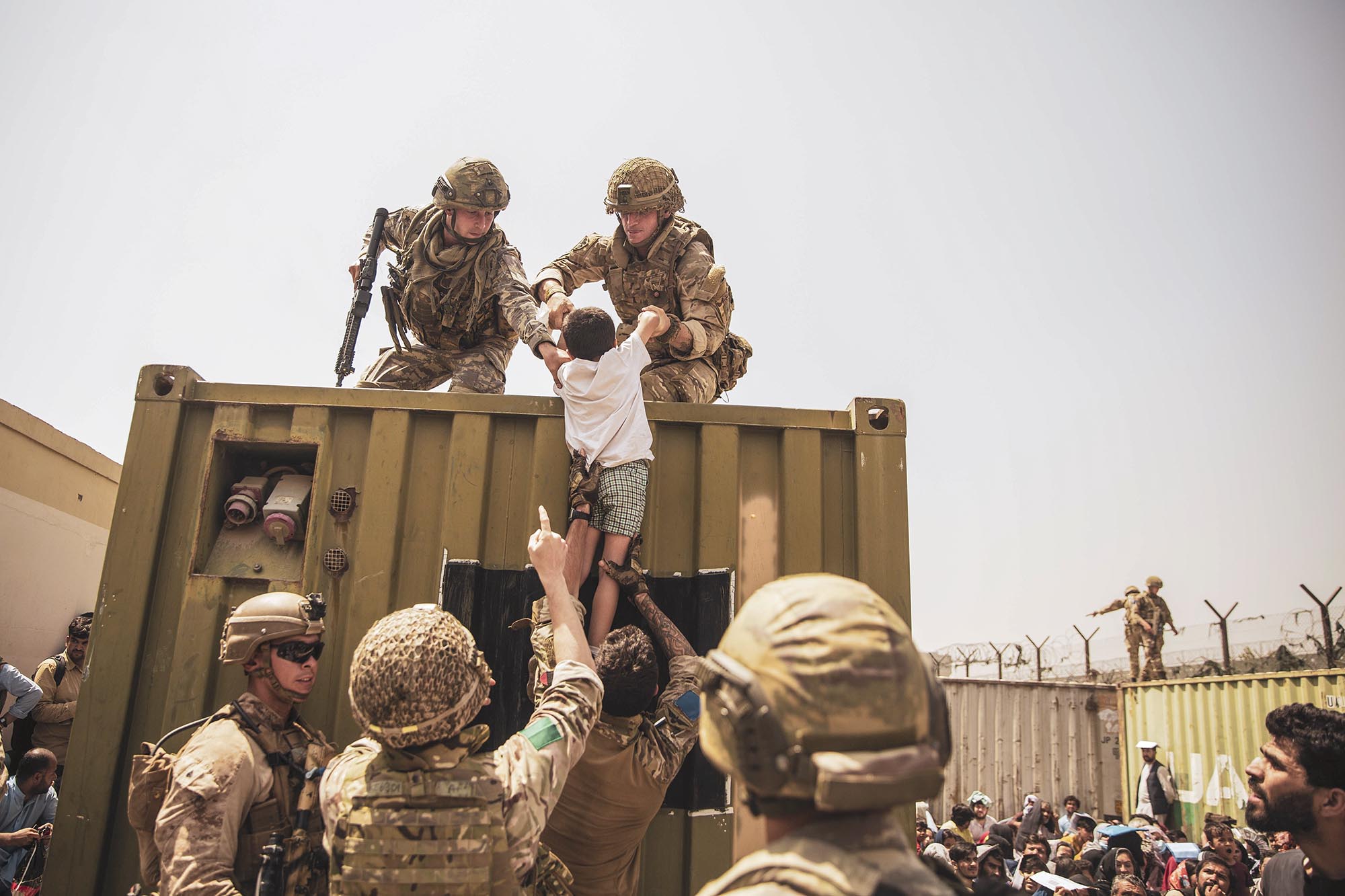As Tuesday’s deadline for U.S. withdrawal from Afghanistan looms, the tragic short-term effects of that withdrawal are apparent.
The Taliban has assumed control of the country, and thousands of people, including Afghans, Americans and American allies, rushed to be frantically evacuated from Hamid Karzai International Airport in Kabul. On Thursday, that same airport was the scene of a deadly suicide bombing attack, perpetuated by ISIS-K, the Afghan affiliate of the Islamic State extremist group. The blast killed at least 170 civilians and 13 U.S. service members.
It’s hard to think beyond the chaos, but the conclusion of a 20-year war also raises many long-term questions – fundamental questions about human rights and the future of the Afghan people, certainly – but also geopolitical questions about the future of the region and America’s role in it.
We asked three faculty members in the University of Virginia’s Democratic Statecraft Lab to weigh in on the geopolitical concerns. The Democratic Statecraft Lab is part of UVA’s Democracy Initiative and examines global threats to democracy, from the COVID-19 pandemic to the rise of authoritarian populism or instances of regime change like the Taliban’s takeover of Afghanistan.
Politics professor Todd Sechser, who studies coercive diplomacy, nuclear security and political violence, directs the lab. He is joined here by politics professors Dale Copeland, who focuses on international relations theory, and John Owen, who studies American influence around the world and has written about political Islam. All three are also senior fellows at UVA's Miller Center of Public Affairs.
Here’s what they had to say about the situation in Afghanistan.
Q. In the last two weeks, we have heard comparisons between the Afghanistan withdrawal and the end of the Vietnam War. Is this another “fall of Saigon”?
Copeland: It is hard to watch the rapid and tragic collapse of the American presence in Afghanistan over the past few weeks and not think of the chaotic U.S. withdrawal from South Vietnam in April of 1975. In many ways the cases are comparable. In both Afghanistan and Vietnam, the pull-outs came after negotiated agreements with extremist adversaries whom American negotiators knew would be unlikely to abide by their agreements. The fall of allied governments upon the withdrawal of U.S. forces was in both cases expected, with all involved nations – including American allies – understanding that the peace deals were simply designed to provide the United States with an “honorable” way to extract itself from a costly quagmire.

Dale Copeland is a professor of politics at UVA and focuses on international relations theory. (Contributed photo)
Yet the parallels end there. In the Vietnam situation, U.S. troops had been removed from a state (South Vietnam) that proved itself able to resist domestic insurgency, and it took a full-scale invasion by an external actor, North Vietnam – coming some two years after the American withdrawal – to finally topple the South Vietnamese regime. The collapse of the Afghan regime came much quicker, and it came from within the state, revealing just how weak the U.S.-supported government in Kabul truly was. Most importantly, the North Vietnamese carried with them a universal ideology that in its Maoist form had great appeal to the peoples of developing nations around the world. The Taliban, on the other hand, promote an ideology that is not even accepted or admired by most other Muslim insurgent groups in the Middle East and North Africa, let alone by the “masses” across the Global South.
Thus, while the collapse in Vietnam in 1975 did send shock waves around the world, and likely played in a role in subsequent communist and left-wing revolutions in places such as Nicaragua, Angola and Ethiopia, it is unlikely that success of the Taliban in Afghanistan will have any ripple effects beyond the short-term encouragement of Islamic extremism in neighboring Central Asian states and Pakistan and perhaps in western China. The United States can leave the “containing” of this extremism to Iran, Russia and China as it reasserts its commitments to security partners on the strategic arc from Japan and South Korea to India, the Gulf States, Turkey and Europe.
Q. Could the war have ended differently?
Sechser: It is easy to forget that just a few weeks after the war in Afghanistan began, Taliban leaders begged the United States for a deal. The United States, however, refused to negotiate the Taliban’s surrender and instead sought a complete military victory so that it could try to build a functioning democracy in Afghanistan. Two decades later, neither of those goals has been realized. The cost of that missed opportunity has been enormous: more than 6,000 Americans, $2 trillion, and perhaps a quarter-million Afghan lives lost during the conflict.
Could the withdrawal have been handled better? Undoubtedly. What was intended to be a gradual withdrawal has instead turned into an emergency evacuation. Getting the remaining Americans out by Tuesday will be a logistical nightmare, and thousands of Afghans who helped the United States over the past 20 years will be left behind. The agony of this episode will linger for a long time.

Politics professor Todd Sechser directs the Democratic Statecraft Lab within UVA’s Democracy Initiative. (Contributed photo)
But it is important to distinguish between tactical and strategic outcomes. The chaotic scene at Kabul airport is a tactical debacle. But at the strategic level, the United States faced only two real options in Afghanistan: withdraw, or maintain a small presence indefinitely, continuing to prop up a deeply corrupt Afghan government and hope to hold off a resurgent Taliban. The problem with the second option is that the Taliban has been growing in confidence and strength, while the U.S.-supported government and national military have not. Eventually the United States would have had to choose between significantly increasing its commitment or withdrawing.
So the reality is that the seeds of this outcome were planted years ago. At this stage of the conflict, neither stasis nor decisive victory were realistic outcomes. The United States could have continued to kick the can down the road for a while, but it would only have delayed the inevitable.
Q. Looking back on the war, how does the Afghanistan episode compare to other cases of forcible regime change?
Owen: The United States has tried regime change in many countries since the early 20th century, with mixed success at best. The U.S. State Department and Pentagon always knew it would not be easy to help shape Afghanistan into a functioning constitutional state – contrary to popular myth, they knew it could never be a Jeffersonian democracy – and now Afghanistan joins the list of American failures. It is a worse failure than Iraq, America’s other post-9/11 attempt at regime change.

Professor of politics John Owen studies American influence around the world and has written about political Islam. (Photo by Dan Addison, University Communications)
The main U.S. successes at regime change, historically, are the famous ones in Germany, Italy, and Japan after World War II. Those cases were difficult enough, but were easier than Afghanistan because the former Axis powers had functioning states, the remnants of political parties and other institutions, an industrial base, advanced infrastructure, and a well-educated and relatively unified population. America also had a great deal of capital to invest and its Marshall Plan helped Germany, Italy and Japan become functioning democracies. Afghanistan had none of that in 2001 when the United States overthrew the Taliban, and these problems proved too much to overcome.
Q. What are the broader implications for the Middle East and Asia?
Owen: In geopolitical terms, Afghanistan is a hinge country connecting the Middle East and South Asia. The most obvious impact of the Taliban’s rapid takeover of Afghanistan is on Pakistan, the country’s large, populous eastern neighbor in South Asia. The Taliban has long had close ties to Pakistan’s powerful military intelligence (the ISI), and some analysts suspect that the uncanny swiftness with which the Taliban took over Afghanistan must have been partly because the ISI coordinated and helped fund it. The ISI sees the Taliban as essential to Pakistan’s efforts to keep its rival India from having influence in Afghanistan. Many Pakistanis disagree and the ISI has been called a “state within a state,” running its own foreign policy. (Pakistan has its own Taliban, dedicated to the overthrow of Pakistan’s government, but its relations with the Afghan Taliban are not good.) So we can see a net gain for Pakistan and a corresponding loss for India, which had close ties to the previous Afghan regime.
To the west of Afghanistan, the big question is how the U.S. withdrawal and Taliban takeover will affect the Persian Gulf cold war between Iran, on the one hand, and Saudi Arabia and its allies, on the other. In the 1990s, the Saudis and other Gulf Arab states were patrons of the Taliban, while Iran was the Taliban’s sworn enemy. Today things are murkier: Iran never liked having U.S. troops in its next-door neighbor and – like Russia and China – has cultivated good relations with the Taliban lately. Tehran says it is ready to get along with the new Afghanistan. The Saudis, United Arab Emirates and other Gulf Arab states, meanwhile, are wary of a Taliban-ruled Afghanistan. These Arab states also are aligned with the United States and worry about what the U.S. departure from Afghanistan means for their own security vis-a-vis Iran.
Q. What are the long-term foreign policy implications for the United States? Is this a blip or a watershed moment?
Sechser: In a few years I think we will look back on the U.S. withdrawal as part of a larger process of strategic reprioritization. Over the last several years, counterterrorism has gradually been replaced by the rise of China as the chief organizing principle of U.S. foreign policy. On paper, China has been the top U.S. strategic priority for a while, but the wars in Iraq and Afghanistan have siphoned U.S. attention and resources. With those episodes now drawing to a close, the United States will be better positioned to focus on China.










